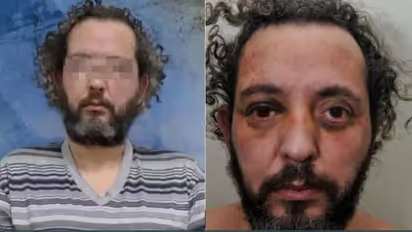Dutch drug kingpin Ridouan Taghi sentenced to life in prison in landmark Marengo trial

Synopsis
Dutch drug lord Ridouan Taghi, along with two co-suspects, faced justice for orchestrating a criminal organization engaged in large-scale international cocaine trafficking and a string of murders.
In a landmark ruling at the Marengo trial on Tuesday, Dutch drug kingpin Ridouan Taghi was sentenced to life imprisonment for orchestrating a string of murders perpetrated by his gang between 2015 and 2017, marking one of the Netherlands' most significant trials. Taghi, aged 46, stands accused as the mastermind behind the Amsterdam-based syndicate, purportedly one of the country's major cocaine distribution networks.
"We are sentencing all the suspects. Ridouan Taghi gets life in prison," said a judge at the Amsterdam District Court.
Sixteen additional suspects received sentences ranging from life imprisonment to one year and nine months.
Despite being apprehended in Dubai in 2019 and detained in an ultra-secure facility, Taghi, according to prosecutors, maintained control by clandestinely communicating with his associates outside prison walls.
Observers note that the "Marengo" trial, named after the judicial code word for the operation that led to charges against Taghi and 16 others, represents an unparalleled case in the Netherlands.
The trial has been conducted under strict security measures, with judges and prosecutors opting to remain anonymous. Tragically, at least three individuals linked to the extensive six-year trial have been assassinated.
On Tuesday, the courthouse on the outskirts of Amsterdam, known as "The Bunker," was heavily fortified by armed police. Officers, armed with automatic rifles and donning face masks for anonymity, encircled the court premises, while drones and a police helicopter monitored from above.
While Taghi and 16 co-defendants were not charged directly for the three murders that occurred during the trial, they faced accusations related to six other instances of murder and attempted murder. These included allegedly ordering approximately 13 assassinations carried out between 2015 and 2017, primarily targeting individuals suspected of cooperating with law enforcement as informants.
In 2017, a man named Hakim Changachi was fatally shot in Utrecht, a tragedy prosecutors deemed a case of mistaken identity.
Shortly thereafter, a significant development occurred in the investigation. One of the suspected gang members, known as "Nabil B.," surrendered himself to the authorities and consented to serve as the primary witness for the prosecution.
Following Nabil B.'s decision to become a state witness, a fresh wave of violence erupted, resulting in three fatalities that deeply unsettled the nation.
In 2018, Nabil B.'s brother fell victim to murder, followed by the targeted assassination of his lawyer, Derk Wiersum, outside his residence in 2019. The shocking violence continued into 2021 with the killing of prominent Dutch crime journalist Peter R. de Vries, who was shot dead in broad daylight in central Amsterdam as he departed a television studio. De Vries had previously disclosed that he was on Taghi's hit-list.
At the time of his murder, De Vries served as Nabil B.'s trusted confidant.
The gang led by Taghi earned the moniker "Mocro-mafia" due to the predominant Moroccan and Antillean heritage of its members.
A Dutch subscription channel produced a fictional series inspired by the gang, set in Amsterdam.
Taghi vehemently denied all allegations, arguing that the resources invested in what he deemed a "sham trial" would have been better utilized in hiring additional teachers, police officers, and healthcare professionals, as reported by Het Parool newspaper.
During the trial, none of the suspects chose to make statements, contributing to several dramatic developments that prolonged the proceedings.
In a surprising turn, Taghi's lawyer, Inez Weski, was arrested in April of the previous year on allegations of facilitating communication between her client and the outside world. This arrest and subsequent detention sparked concern within the Dutch legal community. Although released, Weski remains under suspicion without formal charges.
New legal representation was appointed for Taghi, but subsequent resignations followed, leading Taghi to indicate his intention to represent himself.
The prosecution presented a comprehensive case spanning over 800 pages, featuring evidence not only from Nabil B. but also from intercepted conversations via encrypted telephones known as "Pretty Good Privacy" (PGP) phones, often favored by criminal networks.
Alongside six life sentences, the prosecution sought additional penalties ranging from five to 26 years, with Nabil B. himself facing a potential 10-year sentence.
"It's been a six-year-long process and so much has happened," Dutch criminal law advocate Willem Jan Ausma told Dutch breakfast television show WNL.
"None of it pleasant," he said.
Check the Breaking News Today and Latest News from across India and around the world. Stay updated with the latest World News and global developments from politics to economy and current affairs. Get in-depth coverage of China News, Europe News, Pakistan News, and South Asia News, along with top headlines from the UK and US. Follow expert analysis, international trends, and breaking updates from around the globe. Download the Asianet News Official App from the Android Play Store and iPhone App Store for accurate and timely news updates anytime, anywhere.